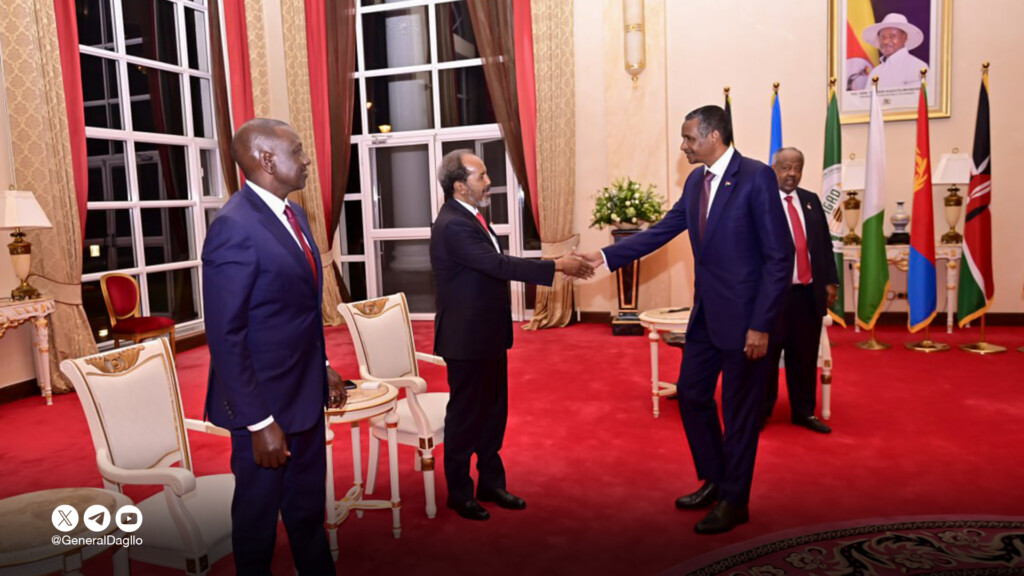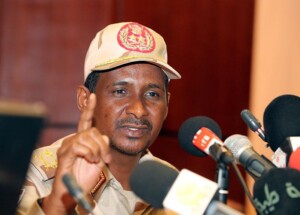Sudan junta freezes IGAD membership after summit boycott

The commander of the paramilitary RSF, Lt Gen Mohamed ‘Hemedti’ Dagalo, greets delegates at the 42nd Extraordinary Summit of the IGAD Heads of State and Government in Entebbe, Uganda (Photo supplied by @GeneralDagllo via X)
The de facto Sudanese government has frozen its membership of the Intergovernmental Authority for Development (IGAD), and says it rejects the outcomes of any initiatives or mediation. The decision follows a tenuous relationship between the junta and IGAD, and days of controversy surrounding the IGAD summit in Entebbe, Uganda, which was attended by former Sudanese prime minister Abdallah Hamdok, and the commander of the paramilitary Rapid Support Forces (RSF), Lt Gen Mohamed ‘Hemedti’ Dagalo, but was notably boycotted by Sudan’s junta leader and commander-in-chief of the Sudan Armed Forces (SAF), Lt Gen Abdelfattah El Burhan.
In a press statement yesterday, Sudan’s acting Ministry of Foreign Affairs say that El Burhan sent a written letter President of Djibouti, Ismail Guelleh, who chaired the 42nd Extraordinary Summit of the IGAD Heads of State and Government, informing him of the decision of the government of Sudan to freeze its membership in the organisation.
These developments come in the context of the already tense relationship between the Sudanese government and IGAD, since the emergency summit on Sudan held in Djibouti on December 9, in which the government rejected the outcomes of the meeting and sent an official letter of protest, refusing to acknowledge what was stated in it.
The foreign ministry’s statement says that the decision to freeze membership of IGAD is “a result of the organisation’s disregard for Sudan’s decision, which was officially conveyed to it last week, to stop its involvement and freeze its dealings with it on any issues related to the current situation in Sudan”.
The ministry explains: “The summit’s final statement contained phrases that violate Sudan’s sovereignty and provoke the feelings of the victims of atrocities committed by the rebel militia and their families.”
The Sudanese government conveyed in its letter to IGAD that it is not obligated and is not concerned with anything issued by IGAD on Sudanese affairs: “What is going on in Sudan is an internal matter, and that the Sudanese government’s response to regional initiatives does not mean giving up the sovereign right for Sudanese problems to be solved by the Sudanese”.
The Sudanese government’s boycott of the 42nd summit, did not prevent African leaders from discussing Sudan, and they received a comprehensive briefing from RSF commander Hemedti, about his vision to stop the war. The head of the Civil Democratic Forces (Tagaddum) also participated in the meeting, and presented its vision to stop the war and achieve peace.
According to the final statement, IGAD offered its mediation for the second time to both parties to the conflict in Sudan, and announced its readiness to offer its efforts to facilitate a comprehensive peace process to end the conflict, in close cooperation with all Sudanese stakeholders, the African Union, and regional and international actors, and indicated the commitment of the parties to the conflict to hold a direct meeting within 14 days.
The African leaders stressed that Sudan belongs not only to the parties to the conflict, but also to the Sudanese people, and renewed their call for an immediate and unconditional ceasefire as well as a cessation of hostilities to end this war, which is affecting the people of Sudan, in preparation for moving forward on the path to political dialogue.
Hemedti: ‘I didn’t start the war’
In an interview with Sky News Arabia, RSF Commander Hemedti launched a sharp attack on the SAF, blaming it for starting the war in Sudan since mid-April. He also expressed his readiness “to immediately cease fire and enter into negotiations if the other party agrees and commits to the path of peaceful negotiation”.
Hemedti said: “I did not start the war, El Burhan did.”
He added: “I cannot stop the war alone. Stopping the war has procedures, and we presented proposals in Jeddah, and 90 percent of the discussions were agreed upon there… The first thing that can be done to bring peace is a ceasefire.”
Hemedti accused El Burhan of distribution of weapons in Darfur, blaming him for the tribal clashes in the region.
The RSF leader also admitted that his forces had made mistakes: “The RSF are not angels. We have field courts and investigation committees to address any transgressions that may be committed”.
He also confirmed the proposal to form a non-ideological national army, with the RSF being a part of it.
“We are committed to having a transitional period before the elections led by those who are honest and patriotic, and non-military.”
FFC-CC
The mainstream Forces for Freedom and Change-Central Council (FFC-CC) welcomed the statement issued at the conclusion of the emergency meeting of the leaders of the IGAD countries in Uganda, on Thursday,
In a press statement on Saturday, the FFC-CC says it regrets the decision by El Burhan to boycott the summit, and said that they still “look forward to El Burhan responding to the renewed call by the IGAD 42nd Summit in order to stop the continued suffering of the people in the areas… The first step is to agree on an immediate and unconditional ceasefire.”
The FFC-CC alliance of pro-democracy parties and groups affirmed the continuation of their contacts and work with all partners to end the war, achieve peace, and establish a democratic civil transition.
They also praised the efforts in which the Civil Democratic Forces (Tagaddum), in which FFC-CC members are also involved, in order to achieve these goals.











 and then
and then